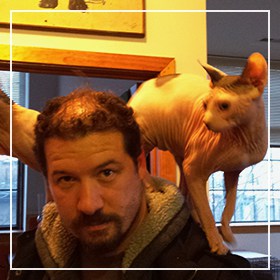When looking for work – particularly the non-academic kind – remember that who you know is often as important, if not more important than what you know or can do. Looking for work is a frustrating and time-consuming process under any circumstances. Oftentimes it feels like you are just throwing resumes into the void with no hope of ever seeing any return on the time it took you to revise (and revise, and revise, and revise) your CV and write YET ANOTHER cover letter. In addition to that, you’re competing with dozens (or even hundreds) of people who are probably just as qualified as you are.
This is not to say that you cannot get a job through that route, but it is a difficult and oftentimes depressing journey. Getting only one interview for every 30 submitted job applications is not a path towards self-affirmation, and maintaining that pattern for months, or even years, can grind away at your confidence.
In my last post I described some ways in which anthropologists can widen their base of opportunities by focusing on skills that will make them desirable and relevant outside of academia. Skills, however, are only one part of the larger equation. As everyone who has studied kinship or social capital is well aware, the world runs on relationships.
Part 2 : People, Reciprocity & Comfort Zones
This may sound obvious, but I know for a fact that there is a huge gap between the knowledge and implementation of this reality within the anthropological community. At the 2013 AAA conference in Chicago a fellow applied anthropologist and I sat on a panel discussing nonacademic jobs for anthropology students with a room full of soon-to-graduate and recently-graduated anthropology PhDs. After the session ended, several people approached us to continue the conversation, and before going our separate ways there was a ritual distribution of business cards among those gathered. A month after the conference, in the course of conversation with that other anthropologist (a PhD who has been working in the private sector for more than 30 years) he expressed his amazement that not one single person he had given a business card to at the conference had followed up with him after the conference.
He did not feel offended or snubbed, he was simply dumbfounded that none of the dozens of people he had given his cards to over the course of the conference had an understanding of basic business etiquette – you exchange cards as part of a larger process of relationship-building. Otherwise, why even bother exchanging cards?
Towards that end, I’d like to share a few words on the importance of people in the job-hunting process.
The old adage, “it’s not what you know but who you know” is painfully true, but it’s not just a matter of who you know, it’s also a matter of who knows you. I would estimate that 75-80% of my success has hinged on people well above my knowledge and experience level who were able to confidently vouch for my skills and abilities. A bad hiring decision can drag a team or a company down for months or even years, so recommendations from trusted associates are like gold when it comes to bringing in new people.
A qualified candidate with a Master’s degree from a state school and a recommendation from a trusted source will beat out an unknown with a PhD from Stanford almost every time.
This is a two edged sword, however. The recommendations you make are a part of your reputation, and therefore cannot be made lightly. If you know people who do good work, do what you can to help them get more work – it will improve your reputation with them and with the people who hire them. But if you recommend someone for a position and they fail to deliver, it will reflect poorly on you as well.
For this reason, it is vital that people who are in a position to recommend you be aware of your capabilities and the quality of your work. It will help them speak more precisely regarding your qualifications, and it will enable them to feel more confident in their recommendations.
Get out of your Comfort Zone!
In an earlier post I echoed William Beeman’s call for increased public engagement through op-eds, but that’s just the beginning. Look for ways to create little nuggets of your work that are easy to get to: 500 word snapshots on interesting and relevant topics in accessible places, book reviews, buzzfeed top-20 lists, anything that moves you out of your academic comfort zone. As I’ve mentioned before, there’s a substantial difference between business writing and academic writing – find ways to show that you can do both. This will be invaluable for generating writing samples, but it is also an excellent way to put yourself on the radar of people who may need to vouch for you later.
Networking is more than just finding people with access and getting access to what you want through them…it is about exchange. In a job-hunting situation, the person with access to jobs is the person that has the leverage – they know that they have something you want; do you have something they want? Think about Mauss’ “The Gift.” Think about the Kula ring. Think about reciprocity.
We’re anthropologists; we should have a clear understanding of how exchange is used to build relationships, so start building!
As you seek out ways to show your unique value, keep the words from Neil Gaiman’s inspirational speech in mind in mind:
“You get work however you get work, but people keep working:
- · because their work is good
- · because they are easy to get along with
- · and because they deliver the work on time
And you don’t even need all three! Two out of three is fine. People will tolerate how unpleasant you are if your work is good and you deliver it on time. People will forgive the lateness of your work if it is good and they like you. And you don’t have to be as good as everyone else if you’re on time and it’s always a pleasure to hear from you.”





